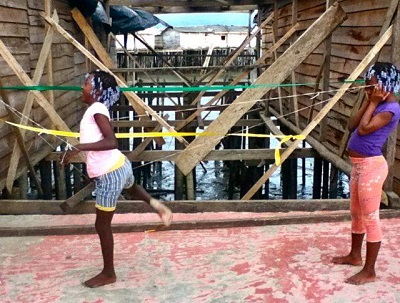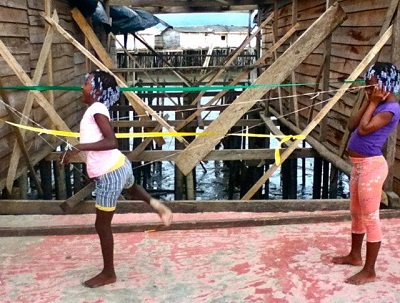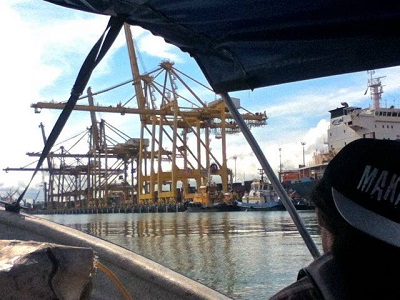
 Children from the community of La Playita play across from the site of where paramilitaries would torture and brutally dismember residents. Residents tore it down and built a community center next door. Several years ago, residents struck a deal with the Colombian military that requires soldiers to stand guard 24/7 to protect people from paramilitary gangs that occupy neighboring communities.For decades, Afro-descendant communities in Colombia have fought for autonomy and self-determination as a response to government policies that produce multiple forms of violence in their communities. Fully aware of, and in solidarity with, mobilizations in Ferguson, Afro-Colombians recognize the common dreams of movements for racial justice for people of color people across the hemisphere. Two members of a delegation that visited these communities in August 2014 reflect on their own solidarity process and explore the ways that transnational solidarity manifests (or doesn’t) in movements. How can we move beyond allyship and towards a practice of co-struggling?
Children from the community of La Playita play across from the site of where paramilitaries would torture and brutally dismember residents. Residents tore it down and built a community center next door. Several years ago, residents struck a deal with the Colombian military that requires soldiers to stand guard 24/7 to protect people from paramilitary gangs that occupy neighboring communities.For decades, Afro-descendant communities in Colombia have fought for autonomy and self-determination as a response to government policies that produce multiple forms of violence in their communities. Fully aware of, and in solidarity with, mobilizations in Ferguson, Afro-Colombians recognize the common dreams of movements for racial justice for people of color people across the hemisphere. Two members of a delegation that visited these communities in August 2014 reflect on their own solidarity process and explore the ways that transnational solidarity manifests (or doesn’t) in movements. How can we move beyond allyship and towards a practice of co-struggling?
One week after Michael Brown was murdered in Ferguson, nine US-based activists and artists of color and one white woman traveled to meet racial justice movement leaders in Colombia. Our delegation was led by Proceso de Comunidades Negras (PCN, Black Community Process), a collective of African-descendant Colombian groups focused on cultural and political power for Colombia’s black population. The history of dispossession is a long one for African descendants in Colombia and across the diaspora i.e. European colonial conquests, subsequent violent and dehumanizing economies of enslavement, the state’s denial of social services and reparations. With the energy of the #BlacksLivesMatter mobilizations flowing through our hearts and minds, we began our weeklong human rights delegation throughout the Southwest Valle de Cauca region of Colombia.
Communities in that region have experienced displacement and disenfranchisement (and/or the threat of them) for decades as a result of large-scale infrastructure development, tourism expansion projects and agricultural policies that favor production of export crops (mainly sugar cane) over domestic food production. Some communities are actively resisting illegal mining operations that destroy and usurp their ancestral territories. Residents are actively resisting the destruction/capture of their land which comes as a result of illegal mining operations. The directors of these illegal enterprises operate with impunity – which is further demonstrated by their use of paramilitary forces to threaten or assassinate community leaders.
Reparations
And if thy brother, a Hebrew man, or a Hebrew woman, be sold unto thee, and serve thee six years; then in the seventh year thou shalt let him go free from thee. And when thou sendest him out free from thee, thou shalt not let him go away empty: thou shalt furnish him liberally out of thy flock, and out of thy floor, and out of thy winepress: of that wherewith the LORD thy God hath blessed thee thou
shalt give unto him. And thou shalt remember that thou wast a bondman in the land of Egypt, and the LORD thy God redeemed thee: therefore I command thee this thing today.
— DEUTERONOMY 15: 12–15
It’s with this Biblical passage that Ta-Nehisi Coates started his crucial essay, “The Case for Reparations.” The passage has very real implications: if a person or community has been subjected to a traumatic period (or century) of bondage and dispossession, it would be unjust and ahistorical to expect that they can immediately begin a productive, happy life with such a deficit in power, resources, and self-determination. Indeed, the historic and collective dispossession of Afro-Colombians must be reconciled through amends and reparations, or the imbalance of power at all levels of society will continue and their newfound “equality” will be nominal only.
Yet instead of redistributing the wealth created off the backs of generations of people of color and through racist and violent projects of dispossession, the US government has successfully streamlined capital and resources into the lucrative projects of the military industrial complex which has been utilized to maintain order more than protect and serve. The racialized patterns of criminalization within this environment of military build-up have created an era wherein the bodies of people of color are treated as criminal until proven innocent. And it is within this setting of very immediate violence and years of residual trauma that Coates’ call for reparations historicizes the urgency for fundamental changes for communities of color.
Reparations have been a central demand of the communities of PCN because the potential for the transformative power of reparations manifests in very real, and urgent struggles. The first community we met with, La Toma, has been struggling to stay on its ancestral land for generations and is constantly threatened by violence and displacement from the decades-long civil war and drug war, both of which were displaced to the countryside in recent years, and from multinationals that act like vultures to the gold in La Toma’s mountains. Although the Colombian state will propagate that there is no racism in Colombia, PCN makes their demands for reparations out of an understanding of persistent and historical racism and injustice.
However, because much of the Colombian political elite take cues from the United States, resources that could protect the autonomy of communities like La Toma and even go toward reparations are instead dumped into projects like Plan Colombia which has deeply militarized the country’s political universe and countryside with billions of dollars of US taxpayer money. The policy continues to fuel one of the most violent conflicts and longestrunning civil wars in the world which has also resulted in the second highest number of internally displaced people in the world after Syria. Adding fuel to the fire, in 2011, President Obama signed into law the US-Colombia Free Trade Agreement, despite the fact that Colombia remains the most dangerous place in the hemisphere for laborers and one of the worst countries in terms of wealth disparity. In conjunction with these global projects of militarization and neoliberalism, the global “War on Drugs” has given us the New Jim Crow in the US and the ruthless pandillas and narco-politics throughout Latin America with tens of thousands of casualties and counting.
The delegation’s visit to Colombia and our conversations with PCN leave us wondering how our movements can globalize solidarity and use intersectional approaches to movement building that can transform this paradigm.
Buenaventura
“We can’t do anything, our job is to protect wealth.” –Colombian Military Officers
 Construction of this international port, Colombia’s most important, violently displaced dozens of waterfront fishing communities. According to our local guide, many of these sites sit on top of mass graves filled with the bodies of former residents who fought to defend this area. The second part of our delegation took us to one of the most dangerous cities in Colombia – which also happens to be 90% African-descendant. Buenaventura, the largest port city in Colombia, responsible for more than 70% of the export/import economy, has become an even more valuable and sought-after site now that the Free Trade Agreement is in effect. Groups that wish to gain power in Colombia recognize the strategic importance of the city and defend their agenda by actively inflicting violence on residents who challenge them. In “chop houses” (casas de pique), paramilitaries literally dismember people alive, letting their screams terrorize surrounding communities with the aim of silencing the population into submission, displacement and powerlessness.
Construction of this international port, Colombia’s most important, violently displaced dozens of waterfront fishing communities. According to our local guide, many of these sites sit on top of mass graves filled with the bodies of former residents who fought to defend this area. The second part of our delegation took us to one of the most dangerous cities in Colombia – which also happens to be 90% African-descendant. Buenaventura, the largest port city in Colombia, responsible for more than 70% of the export/import economy, has become an even more valuable and sought-after site now that the Free Trade Agreement is in effect. Groups that wish to gain power in Colombia recognize the strategic importance of the city and defend their agenda by actively inflicting violence on residents who challenge them. In “chop houses” (casas de pique), paramilitaries literally dismember people alive, letting their screams terrorize surrounding communities with the aim of silencing the population into submission, displacement and powerlessness.
In a case that implicates state collusion in this crippling violence, Justicia y Paz reported that community members knew about a chop house 40 meters from a naval station and asked military officers to intervene. The officers’ response was, “We can’t do anything; our job is to protect wealth.” In order to realize its neoliberal projects, the state turns a blind eye or, at its worse, supports and bolsters (and in many cases, directly profits off of) the territorial concessions of African-descendants’ ancestral lands to multinationals in La Toma and Buenaventura, treating the gruesome brutality that ensues as a necessary part of “development.”
What we find ourselves asking upon our return is how can we address the violence in our cities and the collective trauma of brutal policing that is globalized in nature? How do we struggle and co-struggle in a way that addresses practices that our government exports and enforces upon communities of color the world over? What does solidarity look like when we’re up against a neoliberal form of violence that knows no national borders? How can our co-struggling answer these questions and create operational, collective visions of social change?
Solidarity in Action
Black communities in La Toma and Buenaventura are risking their lives to protect the rights to their territory and voice their demands. In La Toma, the government has not responded to repeated denouncements of illegal mining throughout the surrounding region of northern Cauca. Therefore, community leaders and members have made the decision to confiscate the machinery that is exploiting their land and violating their rights. This is extremely dangerous as the illegal mining operations are often, as in the case of La Toma, guarded by illegal armed groups that kill with impunity. And indeed, many of the leaders of the efforts in La Toma continue to receive death threats. In Buenaventura, communities are establishing humanitarian spaces wherein they force the Colombian military to actually protect them and prevent any illegal armed groups, namely paramilitary actors, to enter their humanitarian space and operate with impunity.
Likewise, communities across the US are putting themselves on the line to vindicate their murdered loved ones and to protest a social order that enforces unofficial segregation and the militarization and criminalization of communities of color. Movements in countries across the hemisphere are organizing solidarity actions and tirelessly resisting the relentless public executions of people of color as well as the subsequent impunity for the perpetrators.
As organizers and activists in Chicago, another heavily segregated city rife with state violence against communities of color, we find ourselves trying to process our time in Colombia and the possibilities for local and transnational solidarity. We also recognize that we could have written a similar article had we traveled to any one of countless places across the globe that are in struggle against the same structures facing communities of Ferguson, La Toma, Buenaventura, Chicago or myriad sites throughout the African Diaspora. Of course, none of these struggles is exactly the same, yet the systems that legitimize the violence we described in each place enjoy global, institutional support.
How can we be more creative in our solidarity so as to respect the limitations of our time and effort while being careful to never lose sight of the global possibilities for movement building? How can international solidarity strengthen our analysis and make our work collective on an international scale? How can we make space in our movements for these questions to gain serious consideration and operational answers? Coming home from Colombia, writing this article and reflecting together, we’re challenged to move from nominal allyship to real co-struggling, that is, implicating our daily work within the collective, cross-border realities of oppression. As many social movements find, there are often no easy roadmaps to liberation. Collectively, we need to reflect, find direction and make the road by walking and co-struggling with each other.
We’re not backing down in the face of Trump’s threats.
As Donald Trump is inaugurated a second time, independent media organizations are faced with urgent mandates: Tell the truth more loudly than ever before. Do that work even as our standard modes of distribution (such as social media platforms) are being manipulated and curtailed by forces of fascist repression and ruthless capitalism. Do that work even as journalism and journalists face targeted attacks, including from the government itself. And do that work in community, never forgetting that we’re not shouting into a faceless void – we’re reaching out to real people amid a life-threatening political climate.
Our task is formidable, and it requires us to ground ourselves in our principles, remind ourselves of our utility, dig in and commit.
As a dizzying number of corporate news organizations – either through need or greed – rush to implement new ways to further monetize their content, and others acquiesce to Trump’s wishes, now is a time for movement media-makers to double down on community-first models.
At Truthout, we are reaffirming our commitments on this front: We won’t run ads or have a paywall because we believe that everyone should have access to information, and that access should exist without barriers and free of distractions from craven corporate interests. We recognize the implications for democracy when information-seekers click a link only to find the article trapped behind a paywall or buried on a page with dozens of invasive ads. The laws of capitalism dictate an unending increase in monetization, and much of the media simply follows those laws. Truthout and many of our peers are dedicating ourselves to following other paths – a commitment which feels vital in a moment when corporations are evermore overtly embedded in government.
Over 80 percent of Truthout‘s funding comes from small individual donations from our community of readers, and the remaining 20 percent comes from a handful of social justice-oriented foundations. Over a third of our total budget is supported by recurring monthly donors, many of whom give because they want to help us keep Truthout barrier-free for everyone.
You can help by giving today. Whether you can make a small monthly donation or a larger gift, Truthout only works with your support.